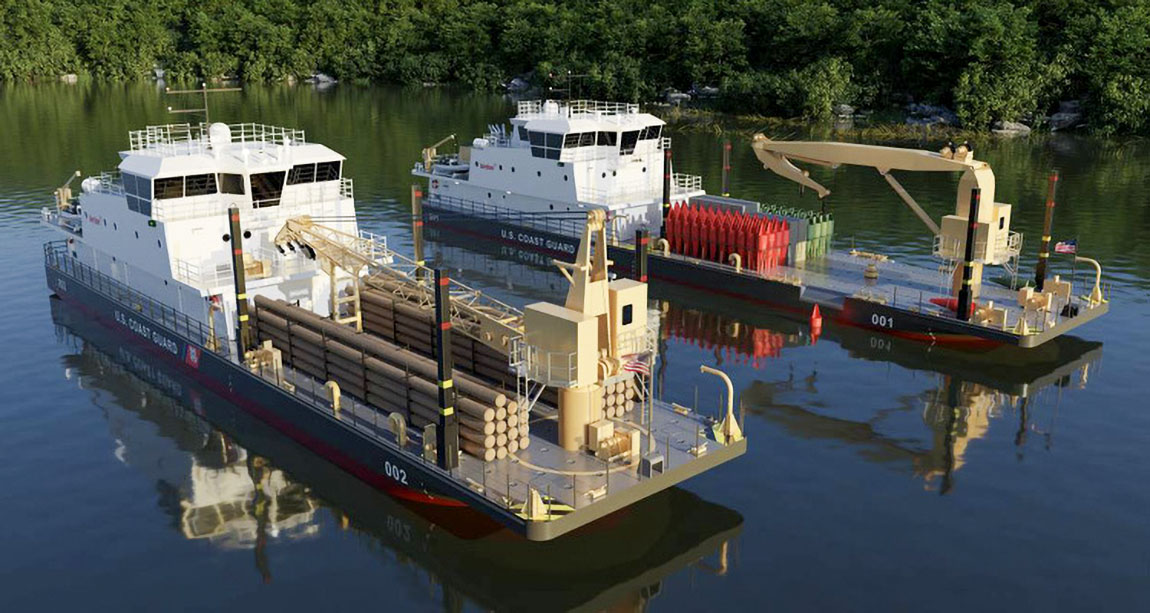A year has passed since the U.S. Coast Guard awarded Denver, Colo.-based Birdon America Inc. an indefinite-delivery, indefinite-quantity firm fixed price contract for the detail design and construction of the Coast Guard’s forthcoming river buoy and inland construction tenders—collectively called the Waterways Commerce Cutter Program (WCC). The contract was announced on October 5, 2022. The total contract value, if all line items are exercised for the 27 cutters, is estimated at $1.187 billion, or nearly $44 million per vessel.
And while progress has been made—the Coast Guard issued Birdon a notice to proceed on March 2, Birdon hosted the initial program management review on June 14, and the company announced several major subcontractor hires this summer—the Coast Guard’s contract with Birdon nonetheless has been dogged by challenges from the start.
Soon after the award announcement, a pair of unsuccessful bidders, Steiner Construction of Bayou La Batre, Ala., and Coden, Ala.-based Master Boat Builders (MBB), protested Birdon’s proposal and the Coast Guard’s evaluation of their own proposals. The challenge went before the U.S. Government Accountability Office, which announced February 8 that it had denied those protests.
At the same time, Steiner and MBB went to the Small Business Administration (SBA) to challenge Birdon’s size and its eligibility to bid on the contract, which was a total small business set-aside. After multiple rounds of appeals, the SBA’s Office of Hearings and Appeals (OHA) issued a final decision September 8, which declared Birdon did not comply with the SBA’s non-manufacturer rule. The final decision followed size determinations at the area office level, which found Birdon was “‘other than small’ for the procurement and ineligible for the award.”
In its review of Birdon, SBA determined the company “failed to meet the requirement that it use its ‘own facilities’” for constructing the Coast Guard cutters and therefore “does not qualify as a manufacturer.” Birdon has stated it intends to contract with Bollinger Shipyards for yard space.
As a non-manufacturer, though, Birdon would have to comply with SBA’s five-pronged non-manufacturer rule, which states “a firm may qualify as a small business concern for a requirement to provide manufactured products or other supply items” if it meets the following terms:
• “Does not exceed 500 employees;
• “Is primarily engaged in the retail or wholesale trade and normally sells the type of item being supplied;
• “Takes ownership or possession of the item(s) with its personnel, equipment or facilities in a manner consistent with industry practice; and
• “Will supply the end item of a small business manufacturer, processor or producer made in the United states, or obtains a waiver of such requirement” pursuant to 13 CFR 121.406.
The SBA area office that reviewed the issue concluded that Birdon failed to meet points two, three and four of the non-manufacturer rule. In issuing the SBA’s final decision, administrative judge Christopher Holleman disagreed with the area office’s stance that Birdon failed to meet point three, which focused on Birdon’s arrangement with Bollinger.
“Nonetheless, I find no error in the area office’s conclusion that [Birdon] does not comply with the non-manufacturer rule, because of its failure to meet prongs [two] and [four],” Holleman wrote.
Addressing the SBA decision, Russell T. “Bubba” Steiner, president of Steiner Construction, said he was pleased with the outcome and called on the Coast Guard to change course on the WCC contract and award the work to a true “small business shipyard.”
“Once the USCG provides the small business shipyards an opportunity to show their capabilities for vessels the size of the Waterways Commerce Cutter, it will be pleasantly surprised, both with the higher quality of the work and lower prices,” Steiner said. “The U.S. Army Corps of Engineers, NOAA and the U.S. Navy have regularly used total small business set asides for new construction and fully recognize that small business shipyard capacity is vital to the shipbuilding needs of our country.”
Steiner went on to point out the price discrepancy between Birdon’s bid and that of Steiner, which was roughly 32 percent less. If all options are exercised for the WCC contract, the average price for a vessel from Steiner Construction would have been just over $33 million, while the average price per vessel from Birdon is estimated at close to $44 million, Steiner said. That price differential means that if the Coast Guard had gone with one of the other bidders on the contract, an additional six to 10 vessels could have been built, he said.
“We relied on the Coast Guard’s promises to exclusively use small business shipyards and spent over a million dollars and substantial time to submit a proposal,” Steiner said. “It now appears that the Coast Guard was willing to pay any price to steer the contract to a large business shipyard for $289 million—or over 32 percent—more than our competitive price.”
Steiner said it’s up to the Coast Guard to decide whether to act on the SBA’s determination that Birdon did not qualify as a small business eligible for the WCC contract. At this point, though, Steiner said he has no reason to believe the Coast Guard won’t proceed with Birdon.
In a statement to The Waterways Journal, the U.S. Coast Guard confirmed the agency is sticking with Birdon.
“The Coast Guard is proceeding with the contract for detail design and construction of two Waterways Commerce Cutter variants, the River Buoy Tender and Inland Construction Tender,” the Coast Guard said in a statement. “The Coast Guard awarded the contract based on an initial determination by the Small Business Administration (SBA) that the offeror was an eligible small business. Neither the Federal Acquisition Regulations nor SBA regulations require termination of a contract awarded on such a basis, even if later appeals before the SBA Office of Hearings and Appeals (OHA) conclude that the awardee is an other-than-small business for the purpose of the procurement.”
It appears Steiner Construction is now standing alone in opposing the U.S. Coast Guard awarding Birdon with the WCC contract. While Master Boat Builders opposed Birdon’s appeal to the SBA in a response dated July 7, Birdon announced in late August that MBB will be subcontractor for building the superstructures for the forthcoming cutters.
The Waterways Journal requested comments from Birdon and Master Boat Builders for this article. As of press time, neither had responded.
Caption for photo: Birdon America rendering of two Waterways Commerce Cutter variants: an inland construction tender, left, and river buoy tender, right. (Image from Coast Guard website)




